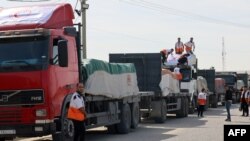A 20-truck convoy of the Egyptian Red Crescent carrying humanitarian aid, including food, medicine and water, began entering the besieged Gaza Strip on Saturday through the Egypt-controlled Rafah Crossing.
“Those trucks need to move as quickly as possible in a massive, sustained and safe way from Egypt into Gaza,” U.N. Secretary-General Antonio Guterres told a peace summit in Cairo Saturday.
He thanked Egypt for its role in facilitating the convoy.
“But the people of Gaza need a commitment for much, much more — a continuous delivery of aid to Gaza at the scale that is needed,” he said. “We are working nonstop with all parties that are relevant to make it happen.”
Dozens of trucks have been lined up near Rafah for several days waiting for the border to open to bring aid to Gaza’s more than 2 million residents.
U.N. humanitarian chief Martin Griffiths said in a statement that the “life-saving supplies” in the convoy are provided by the Egyptian Red Crescent and the United Nations. He said they are approved to cross into Gaza and be received by the Palestinian Red Crescent, with the support of the United Nations.
Saturday’s convoy is the first time that aid has been allowed to enter Gaza since Hamas launched a surprise attack on Israel October 7 that killed some 1,400 people, triggering an Israeli bombing campaign and a total blockade of Gaza. More than 4,000 Palestinians have been killed. Gaza is now bracing for an Israeli ground invasion.
U.S. President Joe Biden announced the deal for limited aid to Gaza during his visit to Tel Aviv on Wednesday, but implementation was delayed as the United Nations worked with Egypt, Israel and the United States to clarify the conditions and limit the imposed restrictions.
U.S. Secretary of State Antony Blinken welcomed the aid convoy, saying its deployment was the result of “days of exhaustive U.S. diplomatic engagement in the region.”
“We urge all parties to keep the Rafah crossing open to enable the continued movement of aid that is imperative to the welfare of the people of Gaza,” Blinken said, adding that Hamas must not interfere with the aid distribution.
“As President Biden stated, if Hamas steals or diverts this assistance, it will have demonstrated once again that it has no regard for the welfare of the Palestinian people and, as a practical matter, it will hinder the international community from being able to provide this aid,” he said. “Civilian lives must be protected, and assistance must urgently reach those in need.”
The World Food Program said three of its trucks were part of the convoy. They carried 60 tons of emergency food, including canned food, wheat flour and pasta. The WFP has another 930 tons of emergency food items at or near the Rafah crossing, ready to be brought into Gaza whenever access is allowed again.
“This food is desperately needed as the conditions inside Gaza are truly catastrophic. These 20 trucks are an important first step, but this convoy has to be the first of many,” WFP Executive Director Cindy McCain said in a written statement.
The World Health Organization said it had four trucks on their way to Gaza carrying trauma kits, medicine for the treatment of chronic diseases, and basic essential medicine and health supplies. It says it has more supplies in Egypt and on the way there.
“The supplies currently heading into Gaza will barely begin to address the escalating health needs as hostilities continue to grow,” the WHO said in a statement. “A scaled up and protected aid operation is desperately needed.”
The U.S. Embassy in Israel warned that any foreign nationals attempting to leave Gaza while the border crossing is open "should expect a potentially chaotic and disorderly environment on both sides of the crossing.”
Secretary Blinken said Washington is working “urgently” with Israel and Egypt to facilitate the safe departure from Gaza of U.S. citizens and their families.





Forum